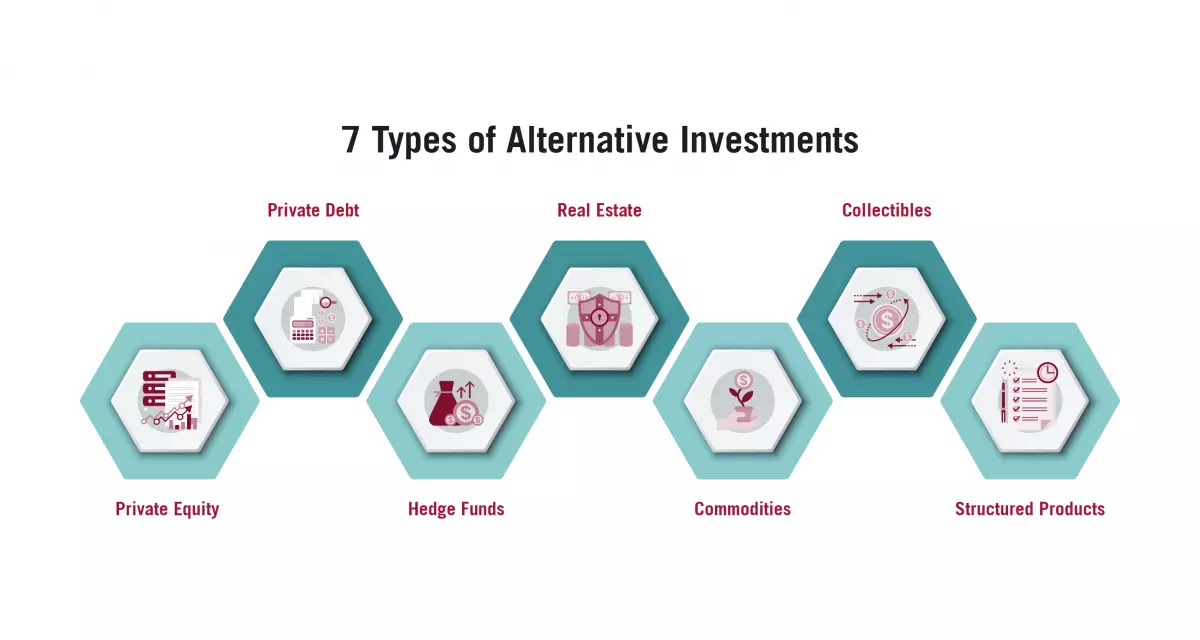Investing goes beyond the realm of stocks, bonds, and cash. While these traditional investments have their place, alternative investments offer a fresh perspective on diversifying your portfolio and maximizing returns. These unique asset classes provide opportunities for both individual investors and industry professionals to explore new avenues of wealth creation.
Understanding Alternative Investments
Alternative investments encompass a wide range of asset classes that differ from traditional investments in terms of liquidity, regulation, and correlation to market conditions. These investments are not easily converted into cash, have lighter regulation from governing bodies, and often move independently from other assets. Alternative investments are gaining popularity due to their potential for higher returns and portfolio diversification.
 Image: 7 Types of Alternative Investments
Image: 7 Types of Alternative Investments
1. Private Equity
Private equity involves investing capital into privately-held companies that are not publicly traded. This category includes venture capital, growth capital, and buyouts. It goes beyond providing financial support - private equity firms offer valuable industry expertise, talent sourcing, and mentorship to help companies thrive.
2. Private Debt
Private debt refers to investments in companies that seek additional capital outside of banks or open markets. These investments are made through private debt funds. Investors in private debt make money through interest payments and the repayment of the initial loan. This asset class offers an alternative source of financing for companies looking to expand.
3. Hedge Funds
Hedge funds are investment funds that employ various strategies to generate high returns. These funds are typically available to institutional investors and high-net-worth individuals. Hedge fund managers utilize different tactics such as long-short equity, market neutral, volatility arbitrage, and quantitative strategies to achieve their investment goals.
4. Real Estate
Real estate is the largest asset class, encompassing properties like land, buildings, and intellectual property. It combines the stability of a bond's cash flow from rent with the potential for capital appreciation. Valuation in real estate investing is a skill that requires a deep understanding of various methods such as income capitalization, discounted cash flow, and sales comparables.
5. Commodities
Commodities are tangible assets such as agricultural products, oil, natural gas, and metals. These assets are considered a hedge against inflation and their value is influenced by supply and demand dynamics. Investing in commodities offers an opportunity to diversify one's portfolio beyond traditional equity markets.
6. Collectibles
Collectibles are unique assets like rare wines, vintage cars, fine art, and coins. The value of these investments appreciates over time. However, investing in collectibles requires expertise as it involves high acquisition costs, lack of regular income, and the need to properly store and care for the assets.
7. Structured Products
Structured products combine fixed income markets and derivatives to create customized investment products. These products offer flexibility to meet specific investment needs. However, they can be complex and carry risks. The 2007-2008 financial crisis highlighted the dangers of certain structured products like collateralized debt obligations (CDO) and mortgage-backed securities (MBS).
Benefits of Alternative Investments
Alternative investments offer several advantages for investors looking to diversify their portfolios. They can reduce overall risk, increase returns, and provide exposure to unique asset classes. As alternative investments become increasingly accessible, it is crucial for investors and aspiring professionals to stay informed about these opportunities to stay ahead in the market.
If you're interested in pursuing a career in alternative investments, consider your professional goals and which asset classes align with your interests. Whether you choose venture capital, real estate, or another alternative investment avenue, these opportunities offer a variety of liquidity, industry exposure, and time horizons.
 Image: A Manager
Image: A Manager
Are you ready to dive into the world of alternative investments? Take our online course, Alternative Investments, and gain the confidence and skills to assess potential investment opportunities and maximize the value of your portfolio. Join one of the fastest-growing fields in finance and unlock your potential for financial success.
This post was updated on April 14, 2022. It was originally published on May 7, 2020.






